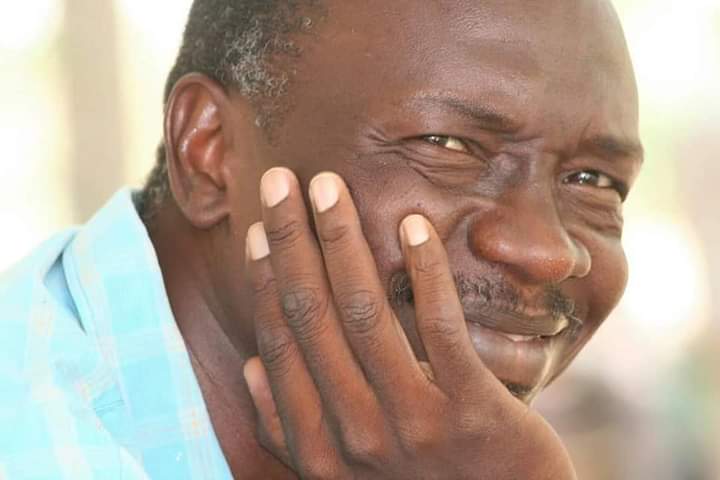
A White Rose for the Late Artist Abdulhakim Amer
By Al-Sir Al-Sayed
Writing about the Sudanese writer, director, and theater actor Abdulhakim Amer makes you feel as if a cloud hovers above you or as if youre walking between shade and sunlight. This is because Abdulhakim always oscillates between roaring energy blended with tranquility and tranquility fused with uproar. This has been the case since I first met him in the early 1990s in the halls of the Youth Palace or the Higher Institute of Music and Theater, where he was a member of the Al-Sadeem theatrical group, in which I, in turn, was a founding member.
He used to come to us like a breeze of wine, as Mahmoud Darwish said, he used to pass by like the end of a prayer. He had a beautiful, strong voice that celebrated the eloquence and aesthetics of classical Arabic. He has written numerous texts, most of which are in classical Arabic. He was frequently seen reciting poetry as if he heard a distant call. He wholeheartedly celebrates writing; he is a poet, a playwright, a radio scriptwriter, and a writer of critical articles. Many articles have been published for him, including his article Sudanese Theater and Intellectual Currents, which was published in Al-Midan newspaper in April 2021. In the field of studies and research, he authored the book In the Understanding of Dramatic Texts, published by the Khartoum Press and Publishing Authority.
Born in 1965, he graduated from the Acting and Directing Department in 1994. He currently works at the Sudan National Theatre and holds the position of Head of the National Acting Troupe. He has extensive experience in acting in Youth and Childrens Palace, Al-Sadeem Group, and the National Acting Troupe, participating in theatrical works that are difficult to list in this celebratory article. However, its worth mentioning a few: the plays The Tragedy of Yarol, The Song of Blood, The Passing People, and The Traffic Signal.
In directing, we remember his works: the play Citizen S and the monodrama The Dancer. As for his writing, he authored theatrical texts like Citizen S, The Blind, The Maternal Uncle, The Girls Café Offers Napkins for Attil and Deidamona, Abu Dhakars Empty and Full Answer, Yago the Other, Habubas Vast Shadow, Tales After Completion, and The Return to the Sound of the Guitar, which is the only published work of his, included in the book Sudanese Texts in 2010 by the Sharjah Department of Culture and Media, United Arab Emirates.
From my perspective, the theatrical texts of Abdulhakim Amer represent a significant milestone in the realm of theater texts from the mid-1990s until now. This is due to the rich linguistic, poetic, and delicate human issues embedded within his works. Hence, I find it necessary for some critics to focus on this distinct and enriching experience in Sudanese theater texts.
Perhaps the best conclusion to this celebratory article is to recall what I wrote about the play The Return to the Sound of the Guitar upon its release. I wrote:
The Father: ... Yet, in moments of intense fatigue and suffering, your image and the image of the house and the land we come from flash in the darkness of my soul...
Aaref: Father, you cant imagine how much we are rejoicing at your return after such a long absence... Joy has returned with you... a joy we had not experienced before, Father.
This play, composed of five characters: The Father, Flash, Aaref, The Mother, and a friend—created an alternative to the conventional divisions in theatrical texts, such as scenes or acts. Each phase or stage of the text had a title. The first title was Time of Return, the second title was Time in the Night, the third title was Time of Celebration, and the fourth title was Time by the River. Since this text, as we have mentioned before, merges poetry with theater, these titles add an additional aesthetic dimension. Simultaneously, they impose settings that provide an extra reason for dialogue to flow and grant the scene a cinematic dimension, making you feel as if this scene could be portrayed cinematically before being transferred to the theater stage.
This play, with its various techniques in writing and diverse approaches, tackled a subject rarely addressed in Arab theater or literature: the celebration of the father. Usually, we celebrate the mother and merely express our love for the father from a distance. Therefore, I can say that this play attempted to convey that a home isnt complete without the presence of a father. The absence of a father could signify an incomplete home in its broader sense, and this is why the father in this text is nameless. He symbolizes all fathers, not just the father of Aaref and Flash. Another noteworthy aspect of this play is the difference in dialogues from one title to another, as well as the differences between the dialogues of the father and mother compared to those of the daughter and son. Despite these variations, they all lay the foundation for the atmosphere of celebrating the father.
I can say that this white rose, which I dedicate to the holder of white intention and the white heart, Abdulhakim Amer, whom I do not know where he is now or what has happened to him, is nothing more than a celebratory sentiment that has encircled me like a cloud, caught between shade and sunlight. As it came while war still kills life and erodes memory, it is necessarily incomplete. The war has severed all communication, distanced us from every reference and source. So, may Abdulhakim and all of you forgive us for any shortcomings and omissions.

